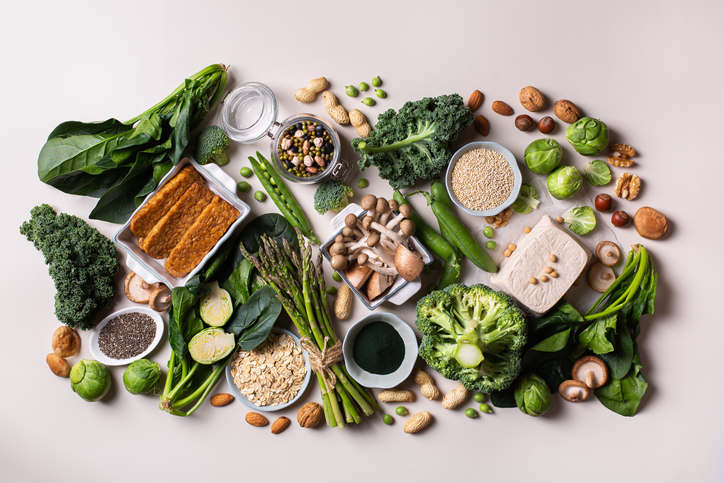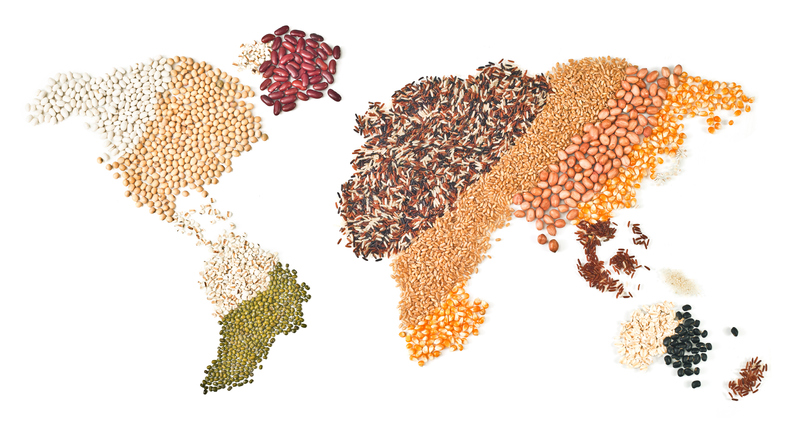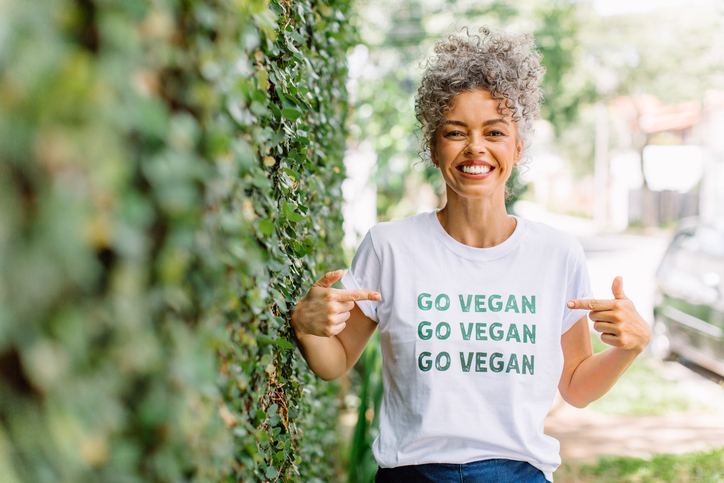In recent years, veganism has proven that it’s no fading fad: The number of people identifying as vegan continues to rise, plant-based food sales and demand are steadily growing, and recommendations for meat-free living by healthcare giants like Kaiser Permanente and the American Institute for Cancer Research ensure the lifestyle is here to stay.
Veganism, in dietary terms, is defined as a diet free of animal products like meat, fish, and poultry as well as dairy, eggs, gelatin, and (for some practitioners) honey. Whether you’re considering going vegan, have already made the switch, or just want a ringside seat to this vegan myth debunking session, we’re here to set the record straight with some honest-to-Betsy-a-rescued-cow-now-living-on-a-sanctuary-farm vegan facts.
1. Vegans Don’t Get Enough Protein

Fact: Vegans can meet their protein needs from plant sources.
“People are often surprised that plant-based foods are actually filled with a good amount of protein and can add up to easily meet your daily needs,” says Krista Maguire, RD, senior nutrition manager for BODi.
Experts differ somewhat on recommended intake, but the Institute of Medicine suggests adults get 10 to 35 percent of their total daily calories from protein for normal healthy function.
Of course, the amount of protein you need also depends on your gender, age, and activity level. Calculate yours using the recommended daily nutrient calculator, and consider these fantastic vegan protein sources:
2. Vegans Are Iron Deficient

Fact: Healthful and nutritionally complete vegan diets can reach daily iron recommendations.
There are two types of iron: heme (meat sources) and non-heme (plant sources). “Plant-based eaters tend to consume more iron than omnivores,” explains Ryan D. Andrews, MS, MA, RD, author of A Guide to Plant-Based Eating. “However, it’s non-heme iron, and absorption of non-heme irons varies substantially.”
The differences in bioavailability of heme and non-heme iron may explain why several studies found sufficient but significantly lower iron levels in non-meat eaters.
To adjust for this difference, the National Institutes of Health recommends that vegetarians consume 1.8 times more iron than people who eat meat. You can hit your recommended dietary allowance (18 mg) through these great non-heme iron sources:
Iron deficiencies are uncommon in the U.S., but Andrews says they are “more typical in pre-menopausal women and anyone who donates blood regularly.”
He cautions against supplementing your iron intake without knowing your blood levels. “Having too much iron in the body is also a situation to avoid,” Andrews adds.
3. All Vegan Food Is Healthy

Fact: Just because a food doesn’t contain animal products doesn’t mean it’s good for you.
Sure, Oreos and Lay’s Potato Chips are vegan, but in order to maintain a well-balanced diet, Maguire recommends foregoing processed food. “The closer the ingredient is to its original form, the better,” she says.
A truly plant-based approach to eating does offer a variety of health benefits — in general, vegetarian diets are associated with lower BMIs and better overall heart health.
The American Dietetic Association further asserts that well-planned vegan and vegetarian diets “may provide health benefits in the prevention and treatment of certain diseases.”
Still, study after study encourages vegans to watch their nutrient intake.
“Plant-based foods vary in their amino acid profile,” notes Maguire, “so eating food combinations like rice and beans or peanut butter on toast ensures your total daily intake consists of complementary amino acids.”
4. Eating Vegan Will Save the Planet

Fact: It’s a lot more complicated than that…
Global agriculture is an incredibly intricate system deeply tied to geography, economics, and cultural values. The optimism of this myth is encouraging, but there’s no single answer to solving climate change.
A comprehensive review of farming’s environmental impacts, however, found even the “lowest-impact animal products typically exceed those of vegetable substitutes.”
Generally, the review found that animal-related products occupy roughly 83 percent of the world’s farmland despite providing just 18 percent of its overall calories. So even just reducing your meat consumption, especially beef, can help lower your carbon footprint.
Andrews agrees that “100 percent plant-based eating generally results in a lighter overall environmental footprint.” Additionally, he says, “it can support the wellbeing of animals, support more humane working conditions for farm laborers, and decrease the odds of developing the most common non-communicable diseases.”
So while veganism may not solve all of the world’s problems, it just might make it a nicer place for the creatures who live here. Including you!
5. Vegans Are Morally Superior

Fact: What people choose to eat is highly personal (and admittedly arbitrary).
“Humans are able to thrive equally well on a variety of eating patterns, including 100 percent plant-based,” says Andrews. No one diet is for everyone, and no one diet is necessarily superior to another.
“The interaction between food and the human body,” he continues, “is profoundly complex. So it’s really tough to say that one way of eating will be nutritionally sound for everyone.”
Basically, people just have to adjust their eating to their bodies, their environment, and their ethical needs. Are strict vegans disciplined? Yes! Are they “better” than you? Nah. They’re just people trying to live their lives like everyone else.
Maguire hopes that “at some point we stop putting labels on ourselves based on what types of food we choose to eat.”
Hopefully learning these vegan facts can help us all have more compassion — even for those who like tofu way too much.

